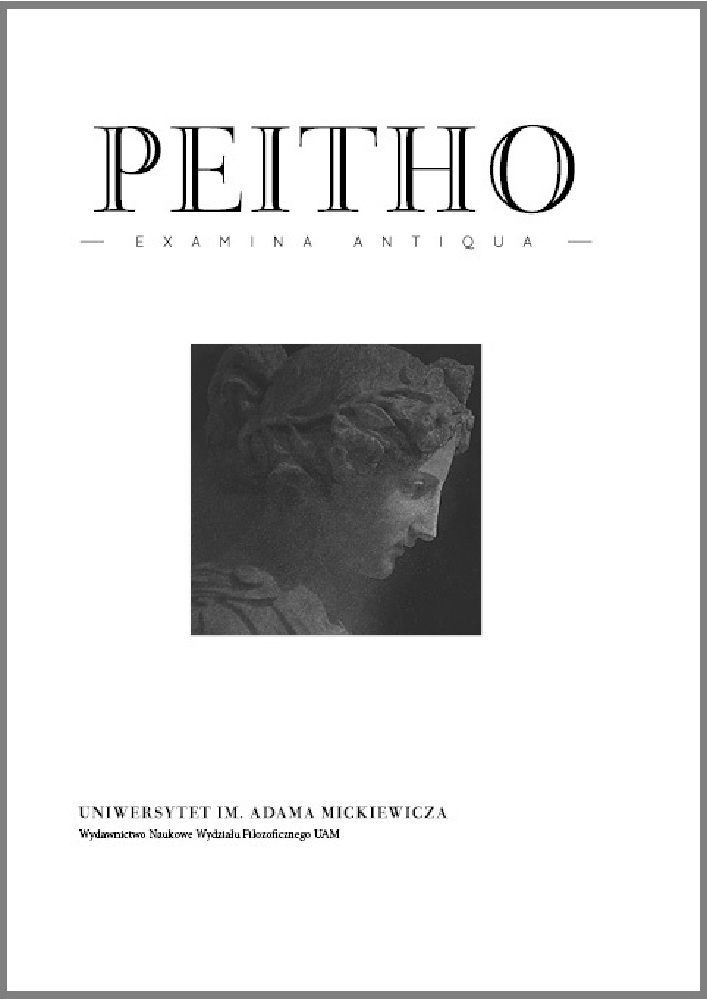Abstract
The present paper focuses on the complex relation between ethics and
politics in Plato’s Crito. While the issue is presented from a contemporary
perspective, the problems of civil disobedience and political
obligation are the present study’s primarily concern. The issue of civil
disobedience concerns moral reasons for breaking the law, whereas
the concept of political obligation refers to a moral duty to obey the law.
When disagreeing with the view that Socrates in the dialogue argues
for an unconditional obedience to the state, the article builds on the
Apology. Subsequently, the similarities between the position of Socrates
and that of H.D. Thoreau are investigated. Finally, the paper discusses
the concept of political obligation so as to show that the argument
in the Crito anticipates several modern theories. The modern controversies
that this article covers are shown to play an important role in Plato’s
dialogue, as they are the basis of Socrates’ political obligation.
References
Arystoteles, 1996, Etyka nikomachejska, przeł. D. Gromska, w: idem, Dzieła wszystkie, t. 5, Warszawa.
Arystoteles, 2001, Polityka, przeł. L. Piotrowicz, w: idem, Dzieła wszystkie, t. 6, Warszawa.
Bedau, H. A., 1982, “Civil Disobedience. Introduction”, in: H. A. Bedau (ed.), Civil Disobedience. Theory and practice, New York, s. 15–26.
Bedau, H. A., 1998, “Civil Disobedience”, in: D. Callahan, P. Singer, R. Chadwick (ed.), Encyclopedia of Applied Ethics, vol. I, Academic Press, s. 501–508
Beys, K. E., 2010, „Prawny, polityczny, filozoficzny i religijny wymiar procesu i stracenia Sokratesa”, Peitho. Examina antiqua 1, s. 45–55.
Bookman, J. T., 1972, “Plato on Political Obligation”, The Western Political Quarterly 25, s. 260–267.
Brownlee, K., 2007, “Civil Disobedience”, in: Stanford Encyclopedia of Philosophy.
Dagger, R., 2007, “Political Obligation”, in: Stanford Encyclopedia of Philosophy.
Dworkin, G., 2006, Imperium prawa, przeł. J. Winczorek, Warszawa.
Hart, H. L. A., 1950, “Are there Any Natural Rights?”, PhR 64, s. 175–191.
Hopton, T., 1998, “Political Obligation”, in: D. Callahan, P. Singer, R. Chadwick (ed.), Encyclopedia of Applied Ethics, vol. III, Academic Press, s. 595–603.
Juchacz, P. W., 2004, Sokrates. Filozofia w działaniu, Poznań, 2004.
Klosko, G., 1987, “The Principle of Fairness and Political Obligation”, Ethics 97, s. 353–362.
Klosko, G., 1989, “Political Obligation and Gratitude”, Philosophy and Public Affairs 18, s. 352–358.
Klosko, G., 1994, “Political Obligation and the Natural Duties of Justice”, Philosophy and Public Affairs 23, s. 251–270.
Klosko, G., 2003, The principle of fairness and political obligation, Rowman & Littlefield.
Klosko, G., 2005, Political Obligations, Oxford.
Kraut, R., 1984, Socrates and the State, Princeton.
Kuniński, T., 2008, „Stosunek Sokratesa do prawa w świetle ‘Obrony’ i ‘Kritona’”, Diametros 17, s. 30–44.
Kuniński, T., 2010, „Problem brudnych rąk. Jak może być złe robienie tego, co słuszne?”, Diametros 24, s. 71–89.
Martin, R., 1970, “Socrates on Disobedience to Law”, RMeta 24, s. 21–38.
Nozick, R., 1999, Anarchia, państwo, utopia, przeł. P. Maciejko, M. Szczubiałka, Warszawa.
Platon, 1999a, Kriton, in: idem, Dialogi, t. 1, przeł. W. Witwicki, Kęty.
Platon, 1999b, Gorgiasz, in: idem, Dialogi, t. 1, przeł. W. Witwicki, Kęty.
Platon, 1999c, Polityk, in: idem, Dialogi, t. 1, przeł. W. Witwicki, Kęty.
Platon, 2002, Obrona Sokratesa, przeł. R. Legutko, Kraków.
Platon, 2003, Państwo, przeł. W. Witwicki, Kęty.
Rawls, J., 1958, “Justice as Fairness”, PhR 67, pp. 164–194.
Rawls, J., 1998, Teoria sprawiedliwości, przeł. M. Panufnik, J. Pasek, A. Romaniuk, Warszawa.
Rawls, J., 2010, „Dwa pojęcia reguł”, in: W. Galewicz (red.), Moralność i profesjonalizm. Spór o pozycję etyk zawodowych, Kraków, s. 125–155.
Simmons, A. J., 1979, Moral Principles and Political Obligations, Princeton.
Simmons, A. J., 1996, “Associative Political Obligations”, Ethics 106, s. 247–273.
Smart, J. J. C., 1973, “An outline of a system of utilitarian ethics”, in: J. J. C. Smart, B. Williams, Utilitarianism; for and against, Cambridge, s. 3–74.
Syse, H., 2010, The Platonic Roots of Just War Doctrine: A Reading of Plato’s Republic”, Diametros 23, s. 104–123.
Thoreau, H. D., 1983, „Obywatelskie nieposłuszeństwo”, in: idem, Życie bez zasad, przeł. H. Cieplińska, Warszawa.
Tukidydes, 2003, Wojna peloponeska, przeł. K. Kumaniecki, Warszawa.
Vlastos, G., 1974, “Socrates on Political Obedience and Disobedience”, The Yale Review 63, s. 517–534.
Vlastos, G., 1991a, “Socrates’ Rejection of Retaliation”, in: idem, Socrates. Ironist and Moral Philosopher, Ithaca, s. 179–199.
Vlastos, G., 1991b, “Happines and virtue in Socrates’ moral theory”, in: idem, Socrates. Ironist and Moral Philosopher, Ithaca, s. 200–232.
Vlastos, G., 1996, “The Historical Socrates and Athenian Democracy”, in: W. J. Prior (ed.), Socrates: Critical Assessments, Routledge, s. 25–44.
Walker, A.D.M., 1998, “Political Obligation and the Argument from Gratitude”, Philosophy and Public Affairs 17, s. 191–211.
Wood, E. M., Wood, N., 1996, “Socrates on Democracy: A Reply to Gregory Vlastos”, in: W. J. Prior (ed.), Socrates: Critical Assessments, Routledge, s. 45–68.
Woozley, A. D., 1980, “Socrates on Disobeying the Law”, in: G. Vlastos (ed.), The Philosophy of Socrates. A Collection of Critical Essays, Notre Dame, s. 299–318.
License
Peitho provides immediate open access to its content on the principle that making research freely available to the public supports a greater global exchange of knowledge.
